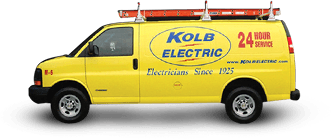
A backup generator gives you peace of mind when the power goes out. Although generators work well in emergencies, they require proper care to prevent failure. If you have not tested or maintained your generator recently, it may not be as ready as you think. Our electricians at Kolb Electric in Elkridge, MD, want to share information to help prepare your generator for power outages. Here are the top generator failure causes and how to avoid them.
Lack of Maintenance
Neglect is one of the most common causes of a backup generator not working. Like any engine, generators need regular maintenance to keep them working effectively. Over time, oil breaks down, filters clog, and components can experience wear and tear. Although these issues may seem minor, they can lead to significant breakdowns if left unchecked.
How to Prevent It
You should schedule annual or semiannual maintenance with our qualified technicians. We will change the oil and filter according to the manufacturer’s recommendation and inspect the belts, hoses, and battery terminals for signs of wear and corrosion.
Dead or Weak Battery
Another top reason why a generator won’t start is battery failure. Generator batteries can discharge over time or become weak. Corrosion, age, and extreme weather can shorten their life.
How to Prevent It
You need to test your battery regularly and have it professionally checked. Generator batteries last about three years. Even if they work fine, you should replace them before then. We can test your battery to ensure it works properly.
Fuel Problems
If you wonder why a generator won’t start, there could be fuel issues. Fuel problems can prevent a generator from starting or running efficiently. Fuel can become stale if it sits too long without stabilizers. You could also have a clogged fuel line.
How to Prevent It
Draining the fuel from the tank and cleaning the fuel system can help restore function. You may also need to check your fuel lines to ensure a consistent supply and proper pressure levels.
Coolant or Oil Leaks
Coolant and oil are vital fluids your standby generator needs to operate effectively. Leaks can cause the generator to overheat, and even a minor drip now could eventually lead to a complete system shutdown in an emergency.
How to Prevent It
You must inspect your generator regularly to check the oil and coolant levels. If you spot a leak, immediately seek repairs to protect your system against damage.
Generator Overloading
Generator troubleshooting involves determining the electrical load of your appliances or systems. Generators have limits. If too many things run on a generator, it may overheat or shut down. Additionally, the generator and connected equipment could experience permanent damage.
How to Prevent It
Knowing your generator’s wattage rating and keeping the total demand below that limit is essential. You can use a transfer switch to prioritize your essential circuits. Our licensed electricians can also help you design a load plan that helps balance safety and performance.
Control Panel and Sensor Malfunctions
Modern generators rely on sensors and control panels to monitor and regulate operation. If any of these malfunctions, the generator may not start. It could also shut down prematurely or fail to detect a problem.
How to Prevent It
You should test the indicators and alarms monthly to ensure proper function. During routine maintenance, our electricians can verify the sensor readings and confirm all displays and automatic settings are working correctly.
Air Blockages or Dirty Filters
Generator engines need proper airflow to operate effectively. The generator may stall if the air intake or exhaust becomes blocked or the air filter becomes clogged. Debris, insects, and nesting animals can cause obstructions that block airflow in Elkridge standby generators.
How to Prevent It
You should regularly inspect the intake and exhaust areas and replace your air filter according to schedule. Keeping the area around your generator free of leaves, debris, and clutter can help prevent blockages, as can our regular maintenance.
Keep Your Generator Ready When It Matters Most
A standby generator is a reliable way to generate electricity during an outage. It gives you complete peace of mind until something happens and it no longer works. Your system needs generator maintenance to keep it working safely and effectively.
You should schedule maintenance every year or after 200 to 400 hours of use. You should also run the generator for about 15 minutes weekly to ensure it starts up and runs normally.
Our trusted professionals can help you keep your generator ready to perform during power outages. Kolb Electric offers Generac generator installation services for residential and commercial customers. Our family-owned and operated business has proudly served our customers since 1925. In addition to generator installation, we also provide 24/7 emergency repairs.
Call our experts at Kolb Electric if you need services for your backup generator in Elkridge.








